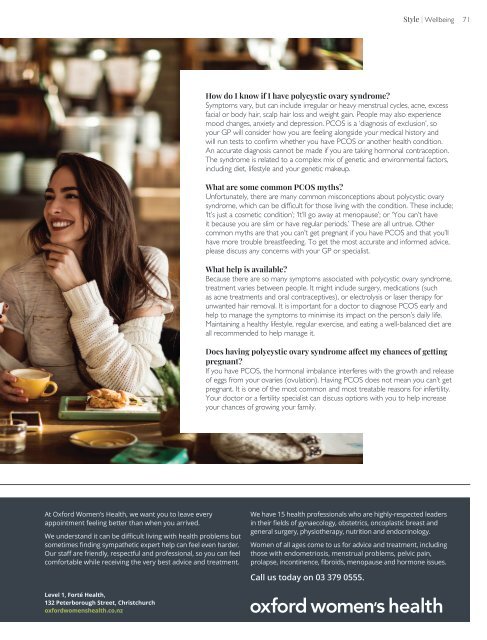Style: October 30, 2020
You also want an ePaper? Increase the reach of your titles
YUMPU automatically turns print PDFs into web optimized ePapers that Google loves.
<strong>Style</strong> | Wellbeing 71<br />
How do I know if I have polycystic ovary syndrome?<br />
Symptoms vary, but can include irregular or heavy menstrual cycles, acne, excess<br />
facial or body hair, scalp hair loss and weight gain. People may also experience<br />
mood changes, anxiety and depression. PCOS is a ‘diagnosis of exclusion’, so<br />
your GP will consider how you are feeling alongside your medical history and<br />
will run tests to confirm whether you have PCOS or another health condition.<br />
An accurate diagnosis cannot be made if you are taking hormonal contraception.<br />
The syndrome is related to a complex mix of genetic and environmental factors,<br />
including diet, lifestyle and your genetic makeup.<br />
What are some common PCOS myths?<br />
Unfortunately, there are many common misconceptions about polycystic ovary<br />
syndrome, which can be difficult for those living with the condition. These include;<br />
‘It’s just a cosmetic condition’; ‘It’ll go away at menopause’; or ‘You can’t have<br />
it because you are slim or have regular periods.’ These are all untrue. Other<br />
common myths are that you can’t get pregnant if you have PCOS and that you’ll<br />
have more trouble breastfeeding. To get the most accurate and informed advice,<br />
please discuss any concerns with your GP or specialist.<br />
What help is available?<br />
Because there are so many symptoms associated with polycystic ovary syndrome,<br />
treatment varies between people. It might include surgery, medications (such<br />
as acne treatments and oral contraceptives), or electrolysis or laser therapy for<br />
unwanted hair removal. It is important for a doctor to diagnose PCOS early and<br />
help to manage the symptoms to minimise its impact on the person’s daily life.<br />
Maintaining a healthy lifestyle, regular exercise, and eating a well-balanced diet are<br />
all recommended to help manage it.<br />
Does having polycystic ovary syndrome affect my chances of getting<br />
pregnant?<br />
If you have PCOS, the hormonal imbalance interferes with the growth and release<br />
of eggs from your ovaries (ovulation). Having PCOS does not mean you can’t get<br />
pregnant. It is one of the most common and most treatable reasons for infertility.<br />
Your doctor or a fertility specialist can discuss options with you to help increase<br />
your chances of growing your family.<br />
At Oxford Women’s Health, we want you to leave every<br />
appointment feeling better than when you arrived.<br />
We understand it can be difficult living with health problems but<br />
sometimes finding sympathetic expert help can feel even harder.<br />
Our staff are friendly, respectful and professional, so you can feel<br />
comfortable while receiving the very best advice and treatment.<br />
We have 15 health professionals who are highly-respected leaders<br />
in their fields of gynaecology, obstetrics, oncoplastic breast and<br />
general surgery, physiotherapy, nutrition and endocrinology.<br />
Women of all ages come to us for advice and treatment, including<br />
those with endometriosis, menstrual problems, pelvic pain,<br />
prolapse, incontinence, fibroids, menopause and hormone issues.<br />
Call us today on 03 379 0555.<br />
Level 1, Forté Health,<br />
132 Peterborough Street, Christchurch<br />
oxfordwomenshealth.co.nz


















